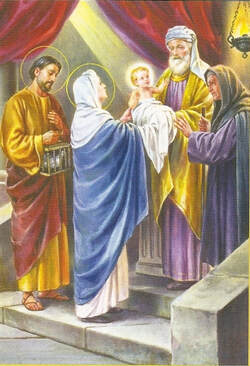
First Point — The prophecy which relates to Jesus. When Simeon declared that Jesus should be the ruin of many, we must not understand that He shall be the author of their ruin, or that He shall lead men to it. This would be simply impious. The Sacred Scriptures, which this divine Child has inspired, are full of His love for all men, His desire to see them merit it, and to obtain their salvation. Simeon wishes to announce that Jesus shall become, not the cause, but the occasion of loss to very many. Jesus shall be what Isaias announced He should be, and what St. Paul declares He has been, viz., "The stone on which they shall fall, and on which many of the children of Israel shall be injured." You shall find those who shall accuse Him because of their fall on that stone, on which their feet have stumbled. Far from Jesus being the cause of our loss, the cause is traceable to ourselves, because we refuse to hear Him, or to obey Him, or to follow Him. It is in a very different sense that holy Simeon said to Mary that Jesus shall be the resurrection of many. In fact. He is not only the occasion of our salvation, as He is of our loss, but He is the true cause of it; He is the general cause of salvation for all men by the benefit of redemption; and He is the particular cause of salvation for the just, because it is He who, by His grace, has wrought their justification. By His passion and death He has opened for us the gates of heaven; He has shown us the way to heaven by His law; by His example He guides us there, and by His strength sustains us in the journey of life. Our salvation, therefore, comes from Him, while our loss comes from ourselves. If you have been stained by sin, you can blame only yourselves for your faults, while, if you have persevered in justice, you must be grateful to Him for your innocence. And thus, among the children of Israel, Jesus has been the resurrection of one part and the ruin of the other: some He has saved, but others are lost through their own fault. What He has been for the age in which He lived and for the nation which possessed Him, He has not ceased to be for all ages and for the whole human race. He has been the resurrection of those who hear His voice, who believe His word, who conform to His law, and who are attached to Him; but He is the ruin of those who disdain to hear Him who refuse to believe Him, who resist His instructions and who disobey His precepts. The manner in which this oracle of Simeon is ac- complished must suggest to us a very sorrowful reflection. When we consider the number of the Jews for whom Jesus was the ruin, and the number for whom He was the resurrection, what a vast dis- parity there exists! On the one hand we behold a handful of disciples, on the other a multitude of enemies. While almost all the citizens loudly demanded that He should be crucified, what a small number of faithful followers retired apart with Him, trembling for themselves and weeping for the Saviour ! The number was small that preserved for Him a personal attachment. Now what was true in His time has been always true; it is true today. The unfortunate disproportion among those for whom Jesus is the resurrection, and those for whom He is the ruin, has continued from generation to generation, even until now. This has been an object of profound sorrow for the pious souls who are members of Christ's Church, and woe to us if we are insensible to it! This culpable indifference should make us tremble, lest we should be numbered among those unfortunates who could make Jesus the cause of their salvation, but instead make Him the occasion of their reprobation.
Second Point. — Holy Simeon announced to Mary that a sword of sorrow should pierce her heart. This prophecy of the holy old Simeon has been fulfilled in Mary, and with a cruel precision. It is the destiny of mortals that no one can exempt himself from the law which condemns all to suffer. Even she who by special privilege was exempted from the stain of Adam has been obliged to submit to this severe condition of suffering. Although she had been declared blessed, and that she should see, in the future, all generations publish her honor, still her heart was a prey to the most bitter affliction. Her august character of Mother of God, which proclaimed her the happiest of women, however, ren- dered her the most afflicted of mothers. For other mothers it is a matter of supremest joy to possess a son, but for Mary it was a subject of constant distress and sadness, because she knew for what fright- ful destinies she had given birth to her Son. St. John, in the Apocalypse, records that he saw Jesus under the figure of a lamb immolated. The sorrowful Mother of Jesus had this lamentable spectacle before her eyes during her whole life. The sweetness of those caresses which she lavished on her Son, the tenderness of her cares with which she surrounded Him, were constantly empoisoned by this horrible image. The very circumstances best calculated to excite her joy recalled the sorrows which awaited her. When she rejoiced to have found Him in the Temple, after an absence of three days, the thought that she should one day lose Him in a more sorrowful manner came quickly to her mind. If she rejoiced at having snatched Him from the fury of Herod, at once she thought that it was only for a death still more cruel she had preserved Him. She rejoiced, it is true, to see Him walking through the cities and villages, working miracles, strewing blessings at every footstep, surrounded by multitudes full of enthusiasm and gratitude; but she saw that same multitude turn against Him with fury, demand His death with loud cries, hasten His punishment, and to insult and raillery add their cruelty. Thus, from the day when the fatal destiny of her Son was revealed to her, the life of Mary was only one long and continual agony. If the heart of Mary was so violently disturbed by the sufferings of her Son, and when she could only foresee them, what must have been her cruel agony when she saw His sufferings realized before her eyes? The desolate Agar, wandering in the desert of Bersabee, was crushed by affliction at seeing the state to which her son Ismael had been reduced. This is the ordinary effect of sorrow, it is the natural promptings of a mother's love; but with the Mother of God everything is supernatural. A love like hers demands the greatest sacrifice. She never left this Son, so dear to her, and she shall not abandon Him until His last sigh on the cross. The Virgin of Nazareth walks to the mountain on which her Son is to be immolated. She walks, followed by some other daughters of Sion, weeping with her for their well-beloved Jesus, and while He shall there consummate the holocaust of His life they shall consummate holocausts of their hearts. There nothing is lost for her which can bring her the deepest affliction; she hears all, sees all — all the cruelties of the executioners and the torments of her Son she feels in her own heart. Moreover, although the fury of the Jews had spared her life, the Fathers of the Church do not hesitate to attribute to Mary the glory of martyrdom; and this martyrdom, although not stained by blood, is not the less heroic. The other martyrs suffered with Jesus reigning in heaven; Mary suffered with Jesus while He suffered on the cross; the prospect of His glory sustained their constancy, but the sight of His humiliations disconcerted the Mother. The love of God was for them a solace, but for Mary it was an increase of sorrow.
O Mary, my Mother, engrave deeply in my heart the memory of thy sorrows, that I may better comprehend how much thou hast paid for the sad privilege of having me for thy child. And Thou, amiable Jesus, give me the grace to follow Thee as my Guide, to imitate Thee as my Model, and to obey Thee as my King, that Thou mayst be for me, not the occasion of my ruin, but the cause of my resurrection and salvation. Amen.
Source: Short Instructions for Every Sunday of the Year and the Principal Feasts, Imprimatur 1897
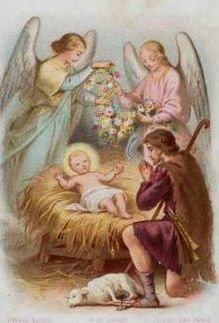
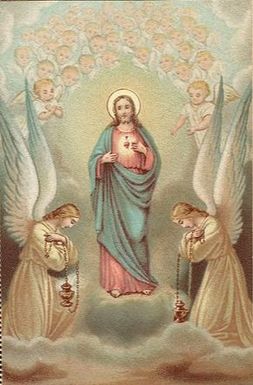
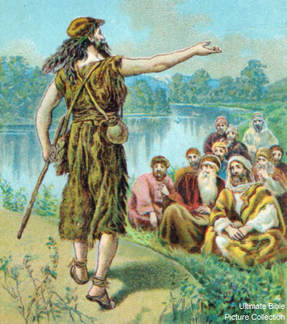
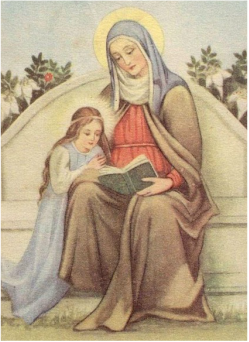
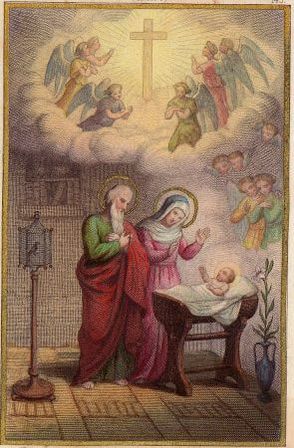


 RSS Feed
RSS Feed